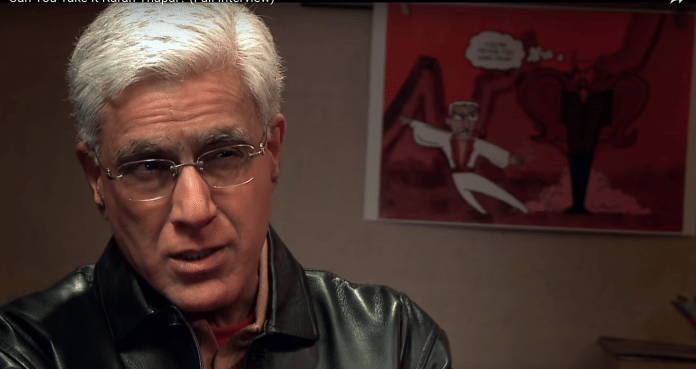In his rather salacious memoir, the journalist doesn’t offer a nuanced perspective about the personalities and events that shaped India.
Veteran journalist Karan Thapar’s memoir, Devil’s Advocate: The Untold Story, is all anyone has talked about lately, courtesy a snippet where he mentions his lost relationship with Prime Minister Narendra Modi.
In the excerpt, Thapar says despite repeated attempts and assurances, from none less than the BJP president Amit Shah, he lost access to Modi after a 2007 interview. Consequently, other BJP leaders too started declining his request for interviews.
It’s perhaps this particular chapter that forced Thapar to tell his story, in a rather sensational memoir.
Privilege, access and entitlement are words that probably sum up Thapar’s life for many. From the very beginning, he found himself at very centre of power in India — Lutyens’ Delhi. He was, after all, born to former Indian Army chief Pran Nath Thapar and is related to prominent historian Romila Thapar, writer Nayantara Sahgal and conservationist Valmik Thapar.
In what can only be called salacious, Thapar recounts his close friendship with Congress leader Sanjay Gandhi, one of the most prominent political figures during the Emergency. But the only detail Thapar offers about Gandhi is that he used to visit his house regularly.
Same goes for other important leaders who find mention in the memoir, including four former prime ministers – P.V. Narsimha Rao, V.P. Singh, Chandrasekhar and Atal Bihari Vajpayee. Thapar recounts in great detail how he managed to meet each of them, some while they were still in office. But Thapar has little insight to offer about any of them.
He also doubts the accuracy of his memory, inexcusably, at many points in the book. He could have maintained notes, or a diary, and if not either, devoted time for research before making claims. He fails on all three counts.
As things stand, the memoir reads more like how things could have been, rather than what they are. It’s a missed opportunity to offer a nuanced perspective about the personalities and events that shaped the social, moral and democratic fabric of India. Instead, it seems to be a vainglorious exercise in self-aggrandisation.
The only interesting tidbit Thapar has to offer is Modi’s take about the Rashtriya Swayamsevak Sangh (RSS). In 2002, Modi, then a BJP office bearer, helped Thapar understand the RSS while he was slated to interview the RSS Sarsanghchalak. Today, it’s difficult to imagine that Modi called his parent organisation ‘mediocre’.
Thapar’s memoir, however, comes across as facile. It reads as if he was writing a tweet and his argument suffered space constraints. A little self-reflection and introspection on the part of the journalist would have gone a long way in making this memoir a worthwhile read. May be, he could have done justice to it by naming it Devil’s Advocate: The Told Story.








Not worth reading.
The moment a journalist thinks of himself as the newsmaker ,bigger than the news itself, becim s highly opinionated and pretends to know the secrets ,befriends politicians,hobnobs with them, I begin to be cautious. It is a disservice to the profession he is in and to the job in hand as merely the carrier of news as known . Rest is all views and opinions which matter least. Karan is often known to attack the guests with a barrage of innuendos that have no basis other than in his own mind. Is he presenting C&A programmes as ‘Shows’, questions and his own posturing as entertainment ? That is deplorable too. In the history of the society, it is known that political and hide,tell lies,mislead and boast .So are th interviewers like Karan Thapar. If fwrreting out the Truth is the ultimate aim, it cannot be found f I’m a comfortable chair. Politicians are scoundrels and are pastmasters at manipulating any and every smartalec C&A anchor. A newsman’s job is to be publish news,debate with h the public whom it impacts and alters his living,even thretens in several ways. Why write a personal memoir ? Who are you ? To earn money from the sales by peddling gossip and more gossip nodoubt. Better to forge Karan Thapar. His memoir will add itself to the pile of waste glorifi d journalist write what thought ever a dust from the street ever clinging to th underside of their expensive shiny shoes. Not to mention suit-boot-ties worn be the wrong men in the wrong weather. Seasoned BBC reporters dig it first hand in the field until their hair turns grey and quietly pass,a duty to inform done and done well. They are all aware that no one is obliged, it is a duty. Karan has gotten away too far, too long.
It is outlandish to expect that the memoirs of interviewers, anchors and reporters are epic and going to make the world a better place to live. MR. Thapar wrote what he remembered and what he thought was dear to him.
It is not readers’ right to expect him to write in the way they want him to write. He or any author can be selective, partisan, objective, or even noble in his writing, deliberately or otherwise. However, it is readers’ right to accept or reject the book. That is supreme and it is guaranteed by readers’ Constitution.
Absolutely right
Memoirs, by nature, provide opportunities to authors to express vain
I am waiting for Shri Shekhar Gupta’s memoirs, written at an age when he fears neither the outrage of friends nor the wrath of the other group …